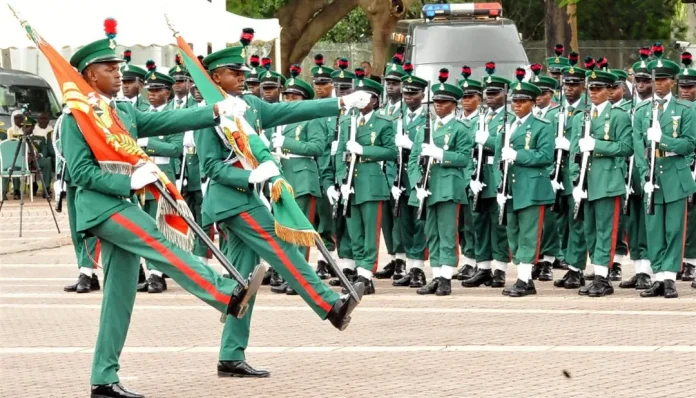AFTER a long period of indifference, it is cheery to note the way Delta youths have turned a new leaf in recruitment into the Nigerian Army. The unprecedented embrace by the youths manifested in the state’s score of 100 per cent in the recent 89th Regular Recruits Intake (RRI). It is indeed a feat, being the first time in recent times that the state filled its quota of 200 slots.
Understandably, the development excited state officials and the Army authority, which before now was of the opinion that Delta State’s youths had lost interest in joining the army, unlike their counterparts in other states of the federation.
Out of the 200 successful candidates recruited from across the 25 local government areas of the state, 100 were deployed to the Nigerian Army Training Depot in Zaria, Kaduna State, while the remaining 100 were moved to the Osogbo training facility in Osun State. As expected, they will undergo various trainings to equip them for service.
Reacting to the positive development, the Director-General, Delta State Bureau for Communications and Orientation, Dr. Fred e Oghenesivbe described the feat as a new chapter in the state’s commitment to youth enlistment in military and paramilitary services.
Like many Deltans and the state government, we celebrate the broken record that has lasted for as long as 2020. The most embarrassing was the 87th Regular Recruitment intake covering non-tradesmen, tradesmen, and women into the Nigerian Army, where only four Delta youths registered online, weeks after the exercise commenced. This was confirmed by the then Team Lead, South-South Recruitment Exercise, Brigadier General Wilto Nzidee from the Army Headquarters in Abuja, Federal Capital Territory (FCT), when he visited the Secretary to the State Government (SSG), Dr Kingsley Emu.
It is heartwarming that the story has changed for good, with both the state and the Army authorities celebrating the landmark record. The celebration is worthwhile considering the challenge, uncomplimentary remarks, apathy, and alleged nepotism that once characterized recruitment into the army.
No doubt, the success could not have been possible without the active commitment of the state Governor, Rt. Hon. Sheriff Oborevwori, who set up a State Awareness Creation Committee on Youth Enlistment into Military and Paramilitary Services, mandating the Secretary to the State Government (SSG), Dr. Kingsley Emu, to oversee its operations. Thereafter, the committee justified its creation through sensitization visits to both the local government chairmen, traditional rulers, youth bodies, and community leaders to mobilise qualified indigenes to participate in the exercise.
The state also provided necessary assistance, like transportation to the venue of the exercise, and tackled other exigencies to promote the recruitment drive and ensure its success. The result is what is being celebrated after these years of low turnout for enlistment into the Nigerian Army. Without mincing words, youths who were idling away and those complaining of lack of jobs have found solace in the exercise.
While the state and its people continue to savour what has been achieved in this recruitment period, it is important to address the factors that accounted for the youths’ lack of interest in previous exercises. Part of the reason is misinformation, as many youths were discouraged by the fear of being posted to the war front to fight terrorists. Also, there was a lack of encouragement and awareness campaigns, nepotism, disinterest, and unattractive positions offered to the recruits.
We commend the state Governor, Rt. Hon. Sheriff Oborevwori, the SSG, and members of the awareness committee, the Recruitment Officer, Lt. Col. Appah, traditional rulers and leaders of thought, and all those who contributed to the success achieved during this period.
In particular, we hail the youths for their participation and urge them to sustain their interest in future exercises. On its part, the Federal Government should make the positions that the youths applied for in the Army attractive and encouraging.
It is important to point out that more work needs to be done to guarantee sustenance in the Army recruitment exercise. Consequently, the state government should work harder to sustain the awareness campaign and reach out to all stakeholders to support the drive.
Since the milestone of Delta filling its quota in the army recruitment exercise did not come so easily, everything should be done to rekindle the youths’ interest rather than allow the recent gain to wane.


